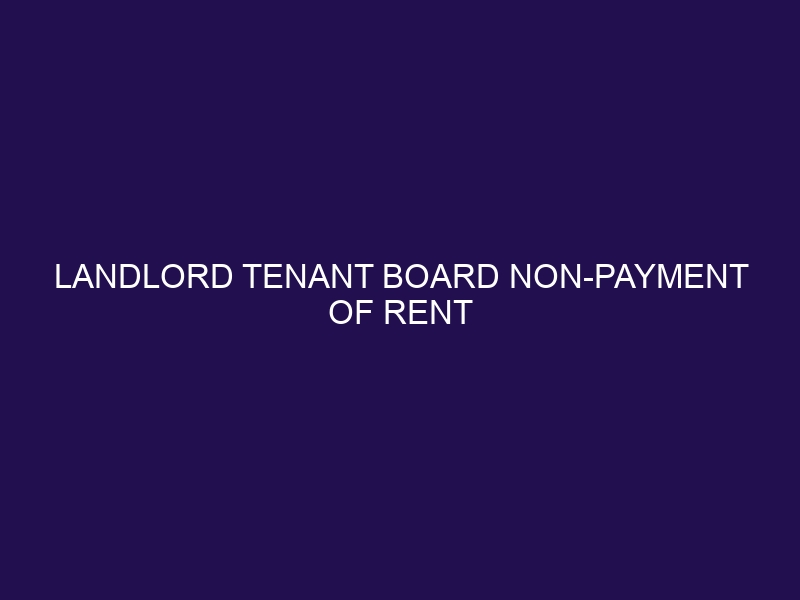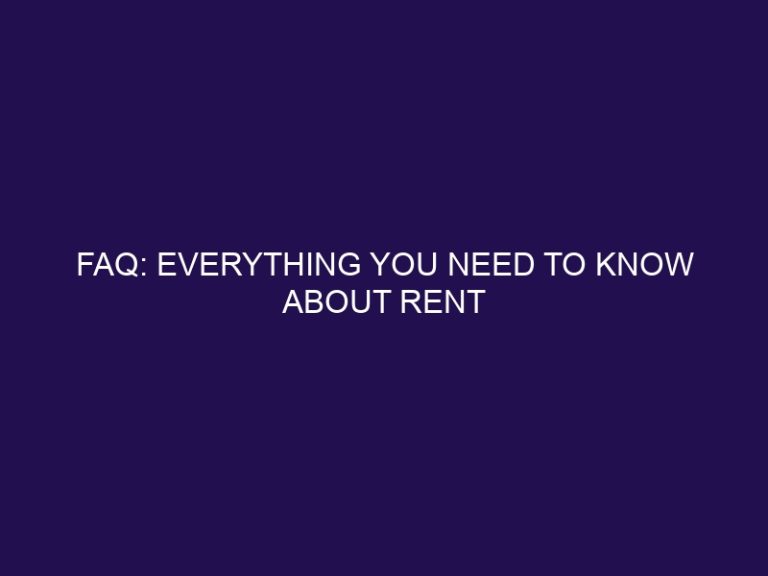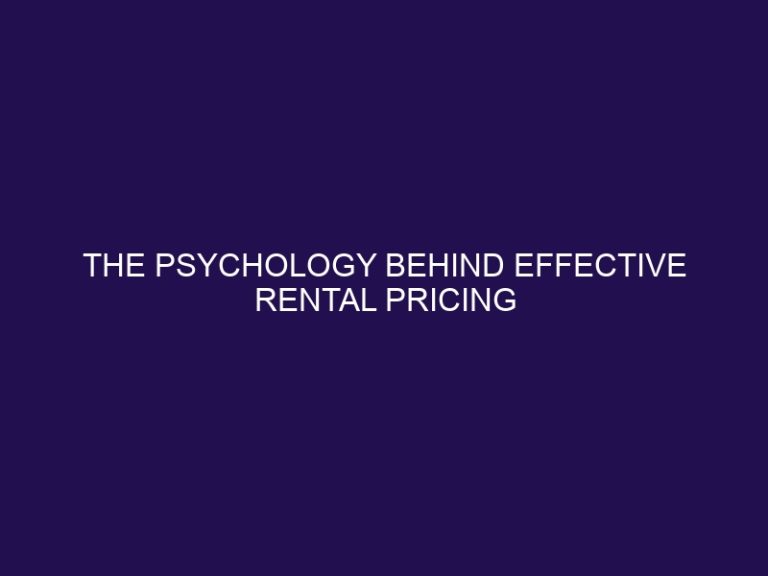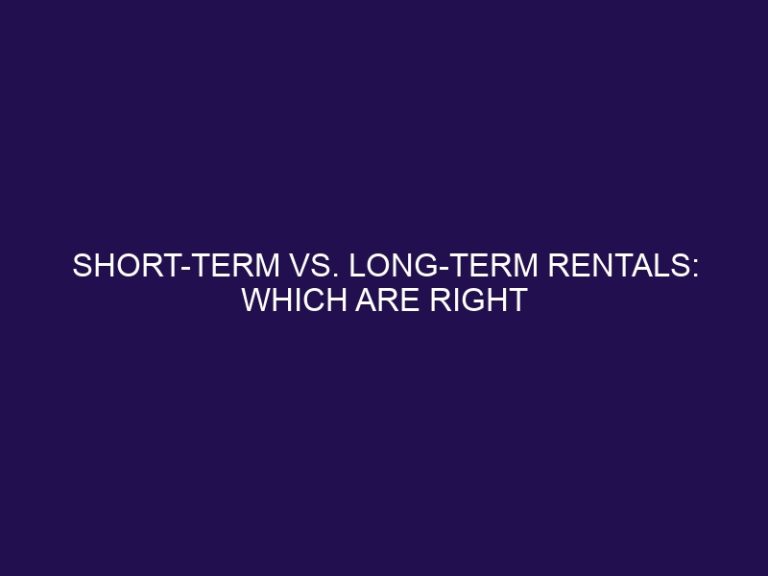Landlord Tenant Board Non-payment of Rent
The Landlord Tenant Board (LTB) is a government agency in charge of resolving disputes between landlords and tenants in the province of Ontario, Canada. Non-payment of rent is a common issue brought before the LTB, where a tenant fails to pay the agreed-upon rent amount to their landlord. This can result in financial and legal consequences for both parties involved.
Landlords have the right to receive rent from their tenants, as stated in the Residential Tenancies Act (RTA). If a tenant fails to pay rent on time, the landlord may take action through the LTB. However, tenants also have rights and responsibilities when it comes to paying rent and living in a rental property.
The process for a landlord to deal with non-payment of rent is as follows:
- Serve a Notice of Termination: A landlord must first serve a Notice of Termination to the tenant, giving them a specific amount of time to pay the outstanding rent.
- File an Application with the LTB: If the tenant does not pay the rent within the specified time, the landlord may file an application with the LTB.
- Attend a Hearing at the LTB: Both the landlord and tenant will be required to attend a hearing at the LTB, where a decision will be made regarding the non-payment of rent.
The consequences for a tenant who does not pay rent can include eviction, damages and costs, and being blacklisted from future rentals. However, there are options for tenants who cannot pay rent, such as negotiating with the landlord, seeking financial assistance, or applying for a rent reduction.
During the process of non-payment of rent, a tenant has the right to remain in the rental property and defend themselves at the hearing. They may also seek the assistance of a lawyer to help navigate the legal process.
In conclusion, non-payment of rent is a serious issue that can have significant consequences for both landlords and tenants. It is important for both parties to understand their rights and responsibilities, and seek proper legal advice if necessary.
Key Takeaways:
1.
2.
3.
What is the Landlord Tenant Board?
The Landlord Tenant Board is a legal entity that serves as a platform for resolving disputes between landlords and tenants. It addresses issues such as non-payment of rent and lease violations, ensuring fair resolutions and enforcing relevant laws and regulations for both parties involved.
What is Non-payment of Rent?
Non-payment of rent is defined as the failure of a tenant to pay their rent according to the terms of their lease or rental agreement. This can result in legal consequences, including eviction or the recovery of past due rent.
A helpful tip is to maintain regular communication, as it can often prevent conflicts related to non-payment.
What are the Rights of a Landlord?
Landlords have the right to receive timely rent payments, maintain peaceful possession of their property, and enforce lease terms. They are also allowed to conduct property inspections with proper notice and take legal action in cases of lease violations or non-payment of rent.
What are the Responsibilities of a Tenant?
The responsibilities of a tenant include:
- Paying rent on time
- Maintaining cleanliness
- Promptly reporting damages
- Adhering to the terms of the lease agreement
What are the Responsibilities of a Tenant?
What are the Steps for a Landlord to Take When Rent is Not Paid?
When a tenant fails to pay their rent, it can put landlords in a difficult position. As a landlord, it is important to know the necessary steps to take in this situation. In this section, we will discuss the three key steps that landlords must follow when rent is not paid. These include serving a Notice of Termination, filing an application with the Landlord Tenant Board, and attending a hearing. By understanding these steps, landlords can navigate the process with confidence and ensure their rights are protected.
1. Serve a Notice of Termination
- Review the lease agreement for termination notice requirements.
- Draft a notice clearly stating the reason and timeframe for termination, in accordance with the requirements outlined in the lease agreement.
- Deliver the notice to the tenant through certified mail or in person, as specified in the lease agreement.
2. File an Application with the Landlord Tenant Board
- Gather all required documentation, including the lease agreement, notice of termination, and proof of non-payment.
- Complete the application form with personal information, reason for application, and desired outcome, in order to file an application with the Landlord Tenant Board.
- Submit the application to the Landlord Tenant Board for review and processing.
3. Attend a Hearing at the Landlord Tenant Board
When attending a hearing at the Landlord Tenant Board, follow these essential steps:
- Prepare all relevant documents and evidence.
- Arrive on time and dress appropriately.
- Respectfully present your case and adhere to the board’s guidelines.
Seek legal advice for professional support during the process.
What are the Consequences for a Tenant Who Does Not Pay Rent?
Failing to pay rent can have serious consequences for a tenant. In this section, we will discuss the potential outcomes for a tenant who does not fulfill their financial obligations to their landlord. These consequences can include eviction from the rental unit, being responsible for damages and costs incurred by the landlord, and being added to a blacklist that can impact their ability to rent in the future. It is important for tenants to be aware of the repercussions of non-payment of rent and to take necessary steps to avoid these consequences.
1. Eviction
- Issue a Notice of Termination to the tenant.
- File an application with the Landlord Tenant Board for eviction.
- Attend a hearing at the Landlord Tenant Board to discuss the eviction.
Did you know? In some jurisdictions, landlords can only evict tenants after obtaining a court order.
2. Damages and Costs
- Legal Costs: Tenants may be liable for the landlord’s legal fees if the case goes to court.
- Civil Damages: Tenants failing to pay rent may be responsible for covering any financial losses incurred by the landlord.
- Additional Charges: Late payment or non-payment may result in additional penalties or interest.
3. Blacklisting
- Blacklisting a Tenant: Landlords may report non-payment to tenant screening services, which can result in difficulties in renting future properties.
Pro-tip: It is always important to communicate with your landlord about any payment challenges to maintain a positive rental record.
What are the Options for a Tenant Who Cannot Pay Rent?
For tenants who are facing financial difficulties and cannot pay their rent, there are a few options available. These options may vary depending on the laws and regulations of the specific region. In this section, we will discuss the different possibilities for tenants who are unable to pay their rent, including negotiating with the landlord, seeking financial assistance, and applying for a rent reduction. It is important for tenants to understand their rights and available options in order to navigate this challenging situation.
1. Negotiate with the Landlord
- Initiate open communication with the landlord to negotiate a resolution for the rent payment issue.
- Discuss potential payment plans or timelines to resolve any arrears.
- Explore options for financial assistance or support if available.
A tenant was able to successfully negotiate a rent payment plan with their landlord, preventing eviction during a challenging financial period.
2. Seek Financial Assistance
- Research local government assistance programs for rental aid.
- Seek non-profit organizations offering financial support for rent.
- Explore community or faith-based organizations providing rental assistance.
Pro-tip: Prioritize openly communicating with your landlord and seeking financial assistance early on to avoid escalating financial challenges.
3. Apply for a Rent Reduction
- Determine eligibility by reviewing the lease agreement and local laws.
- Gather documentation demonstrating decreased income or increased expenses.
- Submit a formal request to the landlord for a rent reduction, including a specific proposed amount.
A tenant successfully negotiated a rent reduction with their landlord after facing unexpected medical expenses, highlighting the value of open communication and mutual understanding.
What are the Rights of a Tenant During the Process?
During the process of non-payment of rent, tenants have the right to receive notice, dispute the eviction, and seek legal counsel. Additionally, they can request a repayment plan and retain their tenancy rights until a formal decision is reached.
How Can a Lawyer Help in a Non-payment of Rent Case?
- Legal Advice: A lawyer can provide guidance on the tenant’s rights and the landlord’s obligations in a non-payment of rent case.
- Documentation: Helping in preparing and reviewing legal documents related to the case.
- Negotiation: Assisting in negotiations for rent payment or eviction with the landlord.
- Court Representation: Representing the client in court proceedings related to the non-payment of rent case.
Seeking legal counsel can ease the complexities of non-payment cases, safeguarding your rights and ensuring a fair resolution to the issue.
Frequently Asked Questions
1. What are the most common reasons for tenants not paying rent?
According to a recent survey, the most common reasons for non-payment of rent include financial difficulties, job loss, and disputes with the landlord.
2. What should a housing provider do when a tenant stops paying rent?
The first step for a housing provider is to determine the reason for the delinquency and attempt to mediate any disputes. If the issue cannot be resolved, the housing provider can take legal action as a last resort.
3. How can landlords decrease delinquencies and boost credit scores?
One way to decrease delinquencies and boost credit scores is by using an online rent payment service, such as Stessa rent collection, which can automate key tasks and report rental payments to credit bureaus.
4. What are the grace periods for rent payment?
Local and state laws may require landlords to give tenants a grace period before charging a late fee. It’s important to review landlord tenant laws and the lease agreement to determine the specific grace period in your area.
5. Is eviction the only option when a tenant doesn’t pay rent?
Eviction should be used as a last resort. Landlords should first attempt to mediate disputes and offer alternative solutions, such as cash for keys. It’s important to follow the legal process and issue orders through the landlord and tenant board.
6. How can landlords collect unpaid rent?
Landlords can collect unpaid rent by filing an application with the landlord and tenant board, which will adjudicate the claim. If the tenant is found in violation of the terms of the lease, the landlord can evict the tenant and potentially collect the rent owed.



![What Is The Empty Homes Tax? [Canada]](https://rentincrease.ca/wp-content/uploads/2023/10/what-is-the-empty-homes-tax-canada_2653-768x576.jpg)



